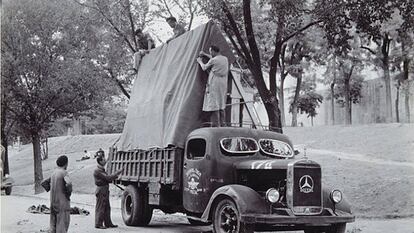Spain’s Prado Museum drafting evacuation plan for its artworks
An outside expert has been hired to come up with detailed instructions on what to do in the event of a fire or terrorist attack

Four days before a fire ravaged Notre-Dame cathedral on April 15, the Prado Museum hired a specialist in heritage risk prevention to draft a protection plan for the museum’s art collections.
Estrella Sanz Domínguez, who teaches restoration at Complutense University’s School of Fine Arts in Madrid, is an expert in risk management and emergency plans. She now has 22 months to identify potential risks to the world-famous museum, such as fires, theft or terrorist attacks, and to come up with “a massive evacuation plan” for the artwork. The museum has invested €55,600 in the project.
The plan must state which artworks should be saved first in the event of an emergency
The plan must establish priorities and state which artworks should be saved first in the event of an emergency. Sanz will have to produce a list of the 250 most important pieces, and create internal emergency teams made up of various employees, from security guards to restorers, to take charge of gems like Velázquez’s Las Meninas or Bosch’s Garden of Earthly Delights.
For each of the 250 priority works, there will be a file containing essential information about how to proceed with the evacuation, the degree of difficulty, and the vulnerability of the work in question. A person will be appointed to head the evacuation, and a destination point established. As for the art that cannot be taken out of the Prado, the museum will consider special on-site measures.
Karina Marotta, the conservation coordinator at the landmark gallery, said that the Prado already has a general emergency plan in place, but that this is something that “is always being tweaked.”
Protecting the collections of Spain’s art museums did not become a public concern until the Lorca earthquake of 2011. After that, the Culture Ministry issued orders to all the relevant agencies and the Prado drafted basic emergency guidelines. But there was only a detailed evacuation plan for temporary exhibits, as this was a demand made by the owners of the art on loan. No large-scale evacuation plan existed for the permanent collection.
Estrella Sanz was hired “because the museum does not have technicians who are sufficiently specialized to draft such a plan,” according to Marotta.
The Civil War precedent

In August 1936, Francisco Javier Sánchez Cantón, who was the deputy director of the Prado, closed the museum and produced a list of 250 artworks that had to be moved out. Thousands of paintings were additionally brought down to the lower floors to prevent damage in the event of air raids by Franco’s forces – which did take place, in November of that year. The paintings were covered with sandbags for added protection.
Working together with the Republican government’s Artistic Heritage Committee, the Prado organized 22 expeditions to Valencia between November 1936 and February 1938, taking out 391 paintings, 181 drawings and the Tesoro del Delfín, a collection of decorative cups made with precious stones and metals that once belonged to Louis of France, the Grand Dauphin.
With Republican forces losing the war, the art was then taken from Valencia to Figueres in Catalonia, and from there to Geneva in Switzerland, where it remained until the end of the war in 1939.
English version by Susana Urra.
Tu suscripción se está usando en otro dispositivo
¿Quieres añadir otro usuario a tu suscripción?
Si continúas leyendo en este dispositivo, no se podrá leer en el otro.
FlechaTu suscripción se está usando en otro dispositivo y solo puedes acceder a EL PAÍS desde un dispositivo a la vez.
Si quieres compartir tu cuenta, cambia tu suscripción a la modalidad Premium, así podrás añadir otro usuario. Cada uno accederá con su propia cuenta de email, lo que os permitirá personalizar vuestra experiencia en EL PAÍS.
¿Tienes una suscripción de empresa? Accede aquí para contratar más cuentas.
En el caso de no saber quién está usando tu cuenta, te recomendamos cambiar tu contraseña aquí.
Si decides continuar compartiendo tu cuenta, este mensaje se mostrará en tu dispositivo y en el de la otra persona que está usando tu cuenta de forma indefinida, afectando a tu experiencia de lectura. Puedes consultar aquí los términos y condiciones de la suscripción digital.








































